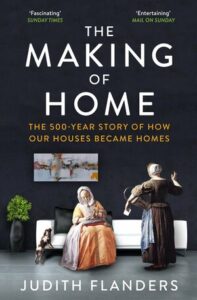
![]()
The Making of Home: The 500-Year Story of How Our Houses Became Homes
Judith Flanders
Non-fiction, paperback
“…the woman’s ability to keep house became central: it reflected her value. It was no longer simply a matter of was the house adequately cleaned, scrubbed, polished? It was how the upkeep had been achieved, which measured not hygiene, but morality.”
As a young girl from Kansas once said, “There’s no place like home.” But what that home looked liked, how it operated, and even what objects were found inside has changed drastically over time. Judith Flanders takes us from the single-room halls of medieval times to the convenience and privacy of modern living, all the while looking for the answer to the question, when did the house become a home?
This is the second of Flanders’ books I’ve read, and I’m already at the point where I’ll read pretty much anything she chooses to write about. She’s clearly a passionate and dedicated researcher; a peep at her bibliography indicates that she’s well-versed in the Victorian era and its dark macabre center. Reading this book was like digging into a box of chocolates, where you’re not sure what you’re doing to bite into next. Beds lived in main rooms, chairs were few and far between but some households had hundreds of tablecloths, a clean house came to indicate a family with good morals, fancy architects wanted houses to look great but didn’t care about functionality…stories connecting through the centuries and resulting in the home as we know it today. My only quibble is that I could only get a taste of each topic before we had to move to the next course. Seconds, please!
Add this to your TBR if you’re looking for interesting high-level info that gives you a springboard to find deeper dives into your favorite nuances.
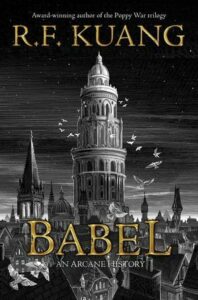
![]()
Babel: An Arcane History
R.F. Kuang
Fiction, paperback, book club
“ ‘There are no kind masters, Letty,’ Anthony continued. ‘It doesn’t matter how lenient, how gracious, how invested in your education they make out to be. Masters are masters in the end.’ ”
In the years leading up to the coronation of Queen Victoria, England has become the center of the world — the magical silver-workings crafted by the translators at Oxford have seen to that. Robin, a Chinese orphan, has spent years learning the skills needed to belong to the esteemed group responsible for maintaining England’s grip on the magic arts. But as he delves deeper into his studies, Robin begins to realize that serving his adopted country may mean betraying his homeland. When things cannot be changed from within, is revolution worth the price?
I wish I could say that I enjoyed this book, but the honest truth is that I lost interest 294 pages in — and with 250 more stretching out ahead of me, I just couldn’t go on (I skimmed the rest because I wanted to be able to speak about the whole story at my book club). I found the story too long, the minutiae the author insisted on sharing about language too dry, the use of footnotes unnecessary, the characters unlikable, and the overall message (that imperialism is bad) too heavy-handed. I can see why it’s gotten the praise it has, but overall this one just wasn’t for me.
Give this a try if you like slow burns, linguistics, and political machinations with a (small) side of magic.
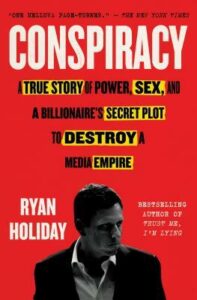
![]()
Conspiracy: A True Story of Power, Sex, and a Billionaire’s Secret Plot to Destroy a Media Empire
Ryan Holiday
Non-fiction, paperback
“The story of this conspiracy, too, is the story of one person working while the other talked big and loud. One side confident in its power and the self-evident inarguability of its position…and the other side…with growing certainty of the evilness of its enemy, willing to put in the work and money it would take to win.”
In 2016, Gawker Media wound up on the losing end of a lawsuit brought by the professional wrestler known as Hulk Hogan. The trial was a watershed in the history of free speech and privacy. And it made headlines again when it was discovered that the entire thing was masterminded and backed by a billionaire who had spent the previous decade conspiring to destroy Gawker.
Billionaire investor outed by gossip rag (most people already knew, or didn’t care). Said billionaire loses his tiny mind and spends the next 10 years building and funding a massive secret effort to bankrupt and destroy the gossip rag. Meanwhile, the founder of Gawker is so busy getting high on his own ego that he can’t see that he’s about to lose…big time. Author Ryan Holiday does an admirable job of telling each side of the story through various philosophical lenses (and encouraging the reader to think about the implications and value of conspiracies) — but in the end it’s two rich middle-aged white dudes fighting their way to the bottom of the barrel.
Read if you like philosophy, legal history, and true stories with zero likable people.
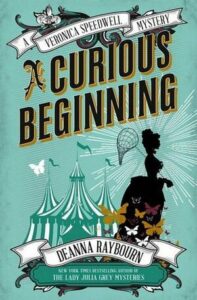
![]()
A Curious Beginning
Deanna Raybourn
Fiction, paperback
“ ‘Why, that is most intriguing. A lady scientist,’ he said in a tone of wonderment. ‘What will they think of next?’ ”
Stumbling across a robbery in progress was not on Ms. Veronica Speedwell’s list of things to deal with on this particular day. Nor was traveling to London with a stranger who promises to tell her the truth of her mysterious parentage. When a more gruesome crime leaves her once again in the dark, she finds an unexpected ally in a grumpy natural historian with his own dark past. It’s now up to this unusual duo to uncover the truth — before they both end up dead too.
This book’s got many of my favorite elements: set in the Victorian era, led by a smart heroine, replete with pearl-clutching and men saying stupid things, a mystery, and of course enough murder to keep things moving along. I added this to my shelf last Christmas and didn’t re-read the summary before diving in, so it was fun to see where the story took me. Veronica is a great character — brilliant and snarky — and I enjoyed the plot twists.
Pick up this first in the Veronica Speedwell series if you enjoy smart women solving crimes in a 19th century setting.
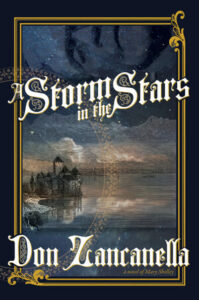
![]()
A Storm in the Stars
Dan Zancanella
Fiction, audiobook
“There is something at work in my soul, which I do not understand.” Mary Shelley, Frankenstein
While many people know the fantastical story behind the creation of Frankenstein, most people don’t know about the life of its creator, Mary Shelley. As the daughter of two famous authors and wife to a third, holder of radical political and religious beliefs, and voracious lifelong reader, it seemed inevitable that she would find literary success. But that journey would not be without its controversies, heartaches, and unfathomable loss.
I’ve seen this book referred to as both “historical fiction” and “fictionalized biography” — but no matter what it’s called, it’s very well done. Zancanella’s writing is deep and luxurious, and I enjoyed seeing Mary come into her own and getting a peek at what her thought and writing process may have been like. Which was a nice contrast to the other main characters: her naive sister, her lover who’s left his marriage and children out of apparent boredom, and a series of travel companions each more self-absorbed than the last. But I still consider it time well spent, and have added both Frankenstein (a re-read) and A Vindication of the Rights of Woman (written by Shelley’s mother) to my TBR.
Read this if you prefer character studies over plot, history with a bit of fiction, and have a high tolerance for men being stupid.






